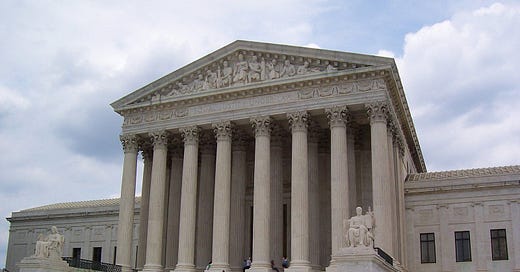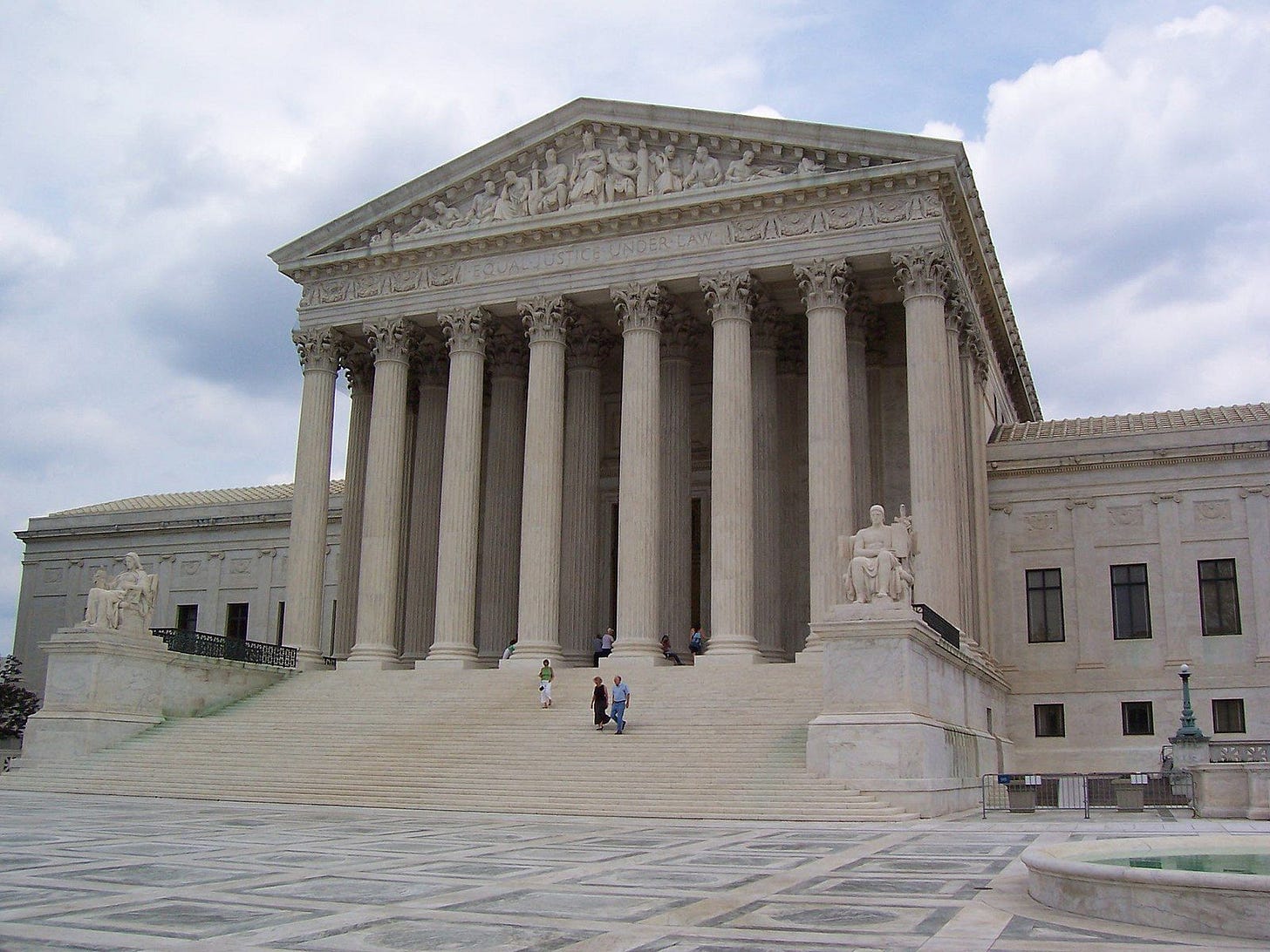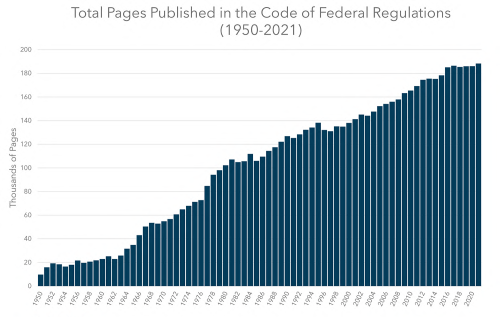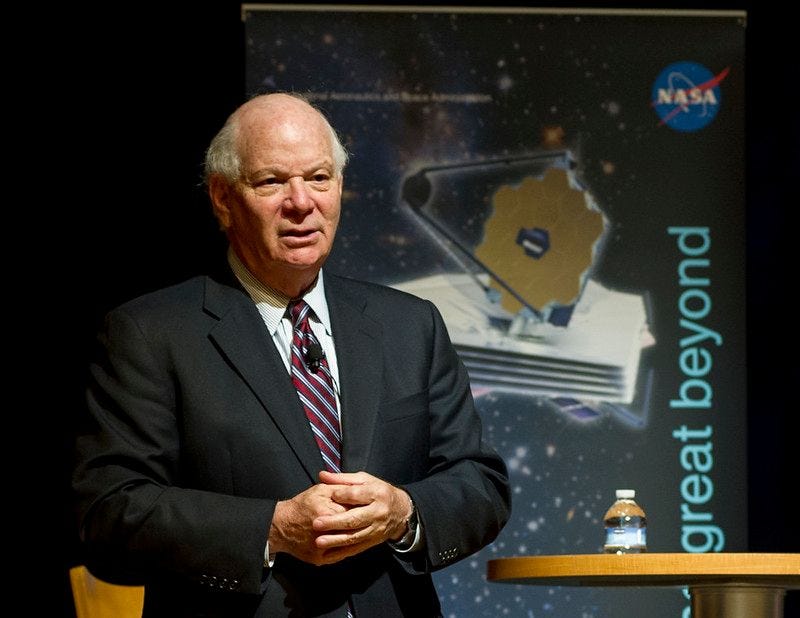The next big Supreme Court case
The Supreme Court has put the regulatory state in its crosshairs with a new case.
Good morning! It’s Tuesday, May 2, 2023. The 2024 elections are 553 days away. Read this newsletter in your browser.
If this newsletter was forwarded to you, subscribe here. If you want to contribute to support my work, donate here.
Supreme Court to hear case that could sharply limit federal government’s power
The Supreme Court, as I noted yesterday, has been very slow to issue opinions this year.
The justices have only decided 15 of the term’s cases, with 44 still to go, a slower pace than any in term over the last 100 years. Major cases on affirmative action, the independent state legislature doctrine, student loans, and LGBT rights have yet to be decided.
But even as they drag their feet on this term’s landmark cases, the justices cast their gaze forward on Monday and announced plans to hear a major case on the regulatory state next term.
On its face, the case — Loper Bright Enterprises v. Raimondo — is fairly niche. It’s a dispute between a coalition of New Jersey fishing companies and the National Marine Fisheries Service, over a rule issued by the agency that would require the companies to pay federal monitors who would sit on their boats and ensure compliance with conservation laws.
But this case is about more than just fishermen: it could lead to the demise of “Chevron deference,” the long-held principle that courts should largely defer to federal agencies in disputes over regulations.
That precedent was created by the Supreme Court in 1984, when the justices unanimously ruled in Chevron v. Natural Resources Defense Council that if a law is “ambiguous” on how it should be carried out, federal agencies have great leeway to issue regulations enforcing their own interpretation of the statute.
If you can already feel your eyes glazing over, remember this: a lot of lawmaking these days is effectively done by regulation.
Constrained by the filibuster and uninterested in risking their seats, members of Congress have increasingly declined in recent years to tackle many of the country’s biggest issues. In doing so, lawmakers have effectively ceded the stage to presidents of both parties, who have filled this vacuum by implementing their policy priorities via regulations that mold the enforcement of existing laws to fit their agendas.
This is how major policy actions on issues like the environment, immigration, LGBT rights, and abortion end up coming from executive branch regulations — and then get picked over by the judicial branch after inevitable lawsuits. The legislative branch, meanwhile, has almost completely removed itself from the equation.
We’ve come a long way from the legislative process envisioned by the Founders and explained in “Schoolhouse Rock.”
Both Democratic and Republican-led Congresses and administrations have participated in this expansion of the regulatory state. Below, see the gradual increase over time in the number of pages published in the Code of Federal Regulations, where all federal agency rules are dutifully recorded:
To be clear, the idea that courts should defer to these federal regulations is already on its last legs. It could be argued that the Supreme Court has already stopped following Chevron deference, as evidenced by a number of recent cases in which the justices struck down rules issued by federal agencies.
In West Virginia v. EPA last year, the justices seemed to endorse the “major questions doctrine,” which sharply limits Chevron by requiring that issues of major political and economic significance be decided by Congress, not the agencies.
But lower courts are still constrained by Chevron, so the justices formally overturning the precedent would still have a major impact on the legal viability of regulations dealing with a range of important issues, especially environmental protections.
How likely is it that the justices will overturn Chevron? After all, the court has whiffed on several opportunities to formally dispense with the doctrine before, opting in previous cases for more limited rulings striking down only the regulation right in front of them.
But the fisheries case is different: for the first time, when agreeing to hear the dispute on Monday, the justices explicitly said they would tackle the question of whether to overturn Chevron.
When petitioning the justices to hear their case, the fishing companies presented two questions to the court:
1. “Whether, under a proper application of Chevron, the [Manguson-Stevens Act] implicitly grants [the National Marine Fisheries Service] the power to force domestic vessels to pay the salaries of the monitors they must carry.”
2. “Whether the Court should overrule Chevron or at least clarify that statutory silence concerning controversial powers expressly but narrowly granted elsewhere in the statute does not constitute an ambiguity requiring deference to the agency.”
In their order on Monday, the justices said they don’t plan on taking up Question 1 — the one actually dealing with the regulation at hand. The oral arguments in the case will focus only on Question 2, a sign that the justices have the Chevron precedent squarely in their sights.
This is in keeping with signals from several of the conservative justices that they are ready to overturn Chevron: Samuel Alito, Neil Gorsuch, Brett Kavanaugh, and Clarence Thomas have all devoted recent opinions to criticizing the precedent and the expansive regulatory state it spawned.
Further impairing the likelihood that Chevron will survive, one of the liberal justices — Ketanji Brown Jackson — has recused herself from the fisheries case, because she already heard it when she was a lower court judge.
The Supreme Court is set to hear oral arguments in the case this fall, with a decision not likely to come until June 2024.
In other news...
DEBT CEILING TALKS: President Biden spoke to the four top congressional leaders by phone on Monday and invited them to a May 9 meeting at the White House. It is Biden’s first major step towards accepting bipartisan negotiations over the debt ceiling and federal spending; House Speaker Kevin McCarthy has been calling for Biden to meet with him again since their last sit-down in February.
Biden may have been spurred to action by Treasury Secretary Janet Yellen’s Monday projection that the debt ceiling deadline has moved up to June 1 due to lower-than-expected tax revenue. One month isn’t much time to hatch a compromise — especially considering Congress will be on recess and Biden will be traveling for much of it. Lawmakers were caught off-guard by the new estimate; earlier projects had said they would have until later in the summer to strike an agreement.
TRUMP AND THE MEDIA: Donald Trump will participate in a CNN town hall next week, his first appearance on the network since 2016. The primetime event will take place on May 10 in New Hampshire, moderated by anchor Kaitlan Collins and featuring questions from GOP primary voters.
Both parties stand to gain from the arrangement. CNN, under new corporate ownership, has been trying to coax more Republicans onto its airwaves in an attempt to regain the trust of GOP viewers. Trump, meanwhile, is seeking to recreate his ubiquitous media presence from 2016 and show he will venture into territory Ron DeSantis will not.
IN AND OUT: Sen. Ben Cardin (D-MD) and Gov. Jay Inslee (D-WA) both announced their retirements on Monday... Sen. Tim Scott (R-SC) plans to launch his presidential bid on May 22... Gov. Glenn Youngkin (R-VA) says he is forgoing a White House run (for now)... Rep. Collin Allred (D-TX) is set to announce a campaign against Sen. Ted Cruz (R-TX) as soon as this week.
GENERATION TO GENERATION: During a Q&A after he spoke at Georgetown on Monday, I asked Georgia Sen. Jon Ossoff, the youngest Senate Democrat, if he believes California Sen. Dianne Feinstein, the oldest Senate Democrat, should resign. “It’s not for me to advise her on that,” Ossoff said, noting the backlog of judges before the Judiciary Committee but adding that “decisions about her future are hers to make.”
POST-PANDEMIC: The vaccine mandates for federal employees and international travelers will end on May 11, the Biden administration said Monday. That’s when the Covid public health emergency is set to expire; as of that day, private health insurers will also no longer be required to pay for Covid tests.
LGBT RIGHTS: A Missouri judge temporarily blocked a rule from the state AG that would limit gender-affirming care to individuals who have experienced three years of documented gender dysphoria and received 18 months of talk therapy... Gov. Kevin Stitt (R-OK) signed a bill into law Monday banning gender-affirming care for minors.
U.S. AND CHINA: China is resisting a push from the U.S. for the two adversaries to build a more reliable system to communicate with each other in case of a crisis... The U.S. military is tracking another potential spy balloon.
Today in government...
White House: President Biden has nothing on his public schedule... Vice President Harris will host Filipino president Ferdinand Marcos Jr. for brunch.
Congress: The Senate will hold votes to confirm two U.S. district judge nominees and advance another... The House is on recess... The Senate Judiciary Committee will hold a hearing on Supreme Court ethics reform, which Chief Justice John Roberts declined to participate in.
Federal Reserve: The Fed’s Open Market Committee will meet today to discuss its next interest rate increase, which will be announced tomorrow. The panel is expected to raise rates at least one more time.
Before I go...
Here’s something interesting: Studies have already shown that AI algorithms can make diagnoses as well as or better than human doctors.
But you would think that humans would perform better at having a, well, human touch when speaking with patients.
Maybe not! A new study by researchers at the University of California San Diego, La Jolla asked both human doctors and ChatGPT to answer 200 patient questions. Their answers were then evaluated for quality and for demonstrated empathy.
ChatGPT won in a landslide: the evaluators preferred the chatbot’s answers almost 80% of the time. Lead author John Ayers explains:
“It’s pretty obvious why AI was better. It’s not constrained by time. You could take a simple query like: ‘I have a headache, can you help me?’ and you’ll immediately see ChatGPT say ‘I’m sorry you have a headache.’ The doctor knows that, they feel that. They don’t have time to say it.”
Thanks for reading.
I get up each morning to write Wake Up To Politics because I’m committed to offering an independent and reliable news source that helps you navigate our political system and understand what’s going on in government.
The newsletter is completely free and ad-free — but if you appreciate the work that goes into it, here’s how you can help:
Donate to support my work or set up a recurring donation (akin to a regular subscription to another news outlet).
Buy some WUTP merchandise to show off your support (and score a cool mug or hoodie in the process!)
Tell your family, friends, and colleagues to sign up at wakeuptopolitics.com. Every forward helps!
If you have any questions or feedback, feel free to email me: my inbox is always open.
Thanks so much for waking up to politics! Have a great day.
— Gabe







